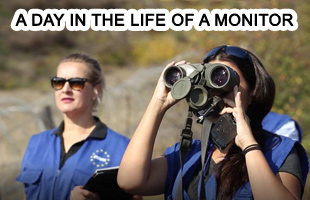Based on the document agreed in Geneva on February 18, the first preparatory meeting of the Incident Prevention Mechanism (IPM) took place on April 23 between the Georgian and South Ossetian checkpoints in Ergneti. At the meeting, facilitated by EUMM and OSCE, representatives of the Georgian, Russian and South Ossetian de facto authorities took part. The Georgian delegation was headed by Shota Utiashvili, Head of the Information and Analytical Department of the Ministry of Internal Affairs, the Russian by General Antonov, Deputy Chief of Staff of the Russian Ground Forces, the South Ossetian by Merab Chigoev Deputy Head to the Plenipotentiary Representative for the Post conflict settlement issues, the EUMM delegation by Ambassador Hansjörg Haber and the OSCE delegation by Pascal Heyman - Deputy Director of the Vienna- based Conflict Prevention Centre.
As foreseen in the Geneva-brokered agreement, the first meeting dealt with procedural issues concerning the organisation of subsequent meetings. In particular, attention focused on the identification of locations, working languages, agenda setting, chairmanship and calendar of the next meetings, the functioning of a hotline for the rapid exchange of information between the sides and the conduct of joint visits. While procedural questions remain open, the sides agreed to convene again, in early May, in a location on Tbilisi-controlled territory to be proposed by the Georgian authorities. Despite the discomfort of holding the meeting in a tent under difficult weather conditions, the sides welcomed the event as a significant step forward and agreed that the functioning of the Incident Prevention Mechanism should improve the security situation in the areas affected by the hostilities in August and the living conditions for the civilian populations on both sides of the administrative boundary line.
After the meeting the Head of the EU Monitoring Mission Ambassador Haber commented;
“We have met here today with all sides indicated in the Geneva mechanism and thereby started it. We discussed procedural issues. We were not able to achieve agreement on all of them. We agreed however to go back to our capitals and try to have more flexibility on all sides on these issues. We agreed that there was a joint interest in having this mechanism working and we agreed on a time interval that is the beginning of May for our next meeting. I think that despite the difficulties that we had there was a joint spirit that we must go ahead with the mechanism – that it is in the interest of the civilian population on both sides of the administrative boundary line to have a working mechanism and I remain optimistic despite all the difficulties we had on procedural issues.”
As foreseen in the Geneva-brokered agreement, the first meeting dealt with procedural issues concerning the organisation of subsequent meetings. In particular, attention focused on the identification of locations, working languages, agenda setting, chairmanship and calendar of the next meetings, the functioning of a hotline for the rapid exchange of information between the sides and the conduct of joint visits. While procedural questions remain open, the sides agreed to convene again, in early May, in a location on Tbilisi-controlled territory to be proposed by the Georgian authorities. Despite the discomfort of holding the meeting in a tent under difficult weather conditions, the sides welcomed the event as a significant step forward and agreed that the functioning of the Incident Prevention Mechanism should improve the security situation in the areas affected by the hostilities in August and the living conditions for the civilian populations on both sides of the administrative boundary line.
After the meeting the Head of the EU Monitoring Mission Ambassador Haber commented;
“We have met here today with all sides indicated in the Geneva mechanism and thereby started it. We discussed procedural issues. We were not able to achieve agreement on all of them. We agreed however to go back to our capitals and try to have more flexibility on all sides on these issues. We agreed that there was a joint interest in having this mechanism working and we agreed on a time interval that is the beginning of May for our next meeting. I think that despite the difficulties that we had there was a joint spirit that we must go ahead with the mechanism – that it is in the interest of the civilian population on both sides of the administrative boundary line to have a working mechanism and I remain optimistic despite all the difficulties we had on procedural issues.”
 |
 |
 |
 |
 |


